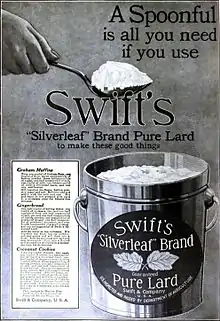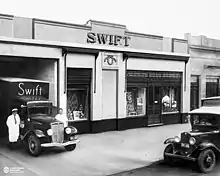JBS USA
JBS USA Holdings, Inc. is an American food processing company and a wholly owned subsidiary of JBS S.A. (B3:JBSS3), a Brazilian company that is the world's largest processor of fresh beef and pork, with more than US$50 billion in annual sales as of 2017. The subsidiary was created when JBS entered the U.S. market in 2007 with its purchase of Swift & Company.
.svg.png.webp) | |
| Type | Subsidiary |
|---|---|
| Industry | Food processing |
| Founded | 1855 |
| Headquarters | , |
Key people | Andre Nogueira, (CEO) |
| Revenue | |
Number of employees | 78,000+ |
| Parent | JBS S.A. |
| Subsidiaries | Plumrose USA, Pilgrim's, Primo Smallgoods |
| Website | jbssa |
JBS USA is based in Greeley, Colorado.[1] Its competitors include Cargill, Smithfield Foods, and Tyson Foods.
History
Swift & Company

JBS USA's operations can be traced back to 1855, when 16-year-old Gustavus Franklin Swift founded a butchering operation in Eastham, Massachusetts.[2] Its early origins on Cape Cod led to later Brighton, MA, Albany, NY, and Buffalo, NY locations, and in 1875 Swift and Company was incorporated in Chicago. Swift and Armour and Company acquired a two-thirds controlling interest in the Fort Worth Stockyards in 1902.[3] That same year, an antitrust lawsuit was filed against Swift for conspiring with other companies to control the meatpacking industry. The companies attempted to merge to avoid the suit, leading to the 1905 Supreme Court case of Swift & Co. v. United States.
In addition to meatpacking, Swift sold various dairy and grocery items, including Swiftning shortening, Allsweet margarine, Brookfield butter, cheese under the Brookfield, Pauly, and Treasure Cave brands, and Peter Pan peanut butter. Swift began selling frozen turkeys under the Butterball brand in 1954. Gustavus Swift also championed the refrigerated railroad car.
Esmark & ConAgra
In the 1960s, Swift expanded into other fields, including insurance and petroleum, and formed the holding company Esmark in 1973. Two years later, Esmark bought International Playtex from Meshulam Riklis' Rapid-American Corporation. Esmark sold off Globe Life Insurance to the Ryan Insurance Group in 1977.[4]
Esmark left the petroleum business in 1980, selling Vickers Petroleum to Mobil, while Swift's fresh-meat business was spun off as a separate company, Swift Independent Packing Company (SIPCO), the same year.[5] Esmark went on to purchase Norton Simon Inc. in 1983 before being purchased by Beatrice Foods the next year. ConAgra purchased 50% of SIPCO in 1987 and the remaining portion in 1989, the same year ConAgra bought Beatrice Foods.[6] ConAgra merged SIPCO's operations with that of Monfort, the meatpacker it had purchased in 1987, and the division was renamed Swift & Company in 1995.[6]
In 2002, ConAgra sold a majority stake in Swift & Company to Hicks, Muse, Tate & Furst, a Dallas-based private-equity firm, and Booth Creek Management.[7] Hicks, Muse bought the remainder of ConAgra's stake in 2004.[8]
Purchase by JBS
On July 12, 2007, JBS purchased Swift & Company in a US$1.5-billion, all-cash deal. The acquisition made the newly consolidated JBS Swift Group the largest beef processor in the world. Prior to the deal, JBS had a market capitalization of US$4.2 billion and sales revenue of $2.1 billion, and operated in 23 plants in Brazil and five in Argentina.
On July 11, 2007, the Swift companies had also completed several tender offers and consent solicitations for financing notes. These included 10⅛% senior notes due 2009 and 12½% senior subordinated notes due January 1, 2010, both issued by Swift & Company, 11% senior notes due 2010 issued by S&C Holdco 3 and 10¼% convertible senior subordinated notes due 2010 issued by Swift Foods Company.
In 2008, JBS purchased the beef operations of Smithfield Foods for $565 million.[9] JBS also announced in 2008 its intention to buy National Beef Packing Company for $560 million, but canceled the plan after the U.S. Department of Justice raised antitrust concerns.[10]
In 2009, JBS USA acquired 63% of Pilgrim's Pride[11] Chicken Company and shortened the name to simply 'Pilgrim's'. JBS subsequently increased its ownership share to 75.3%.
In 2009, JBS USA Holdings, a Delaware company which operates at 1770 Promontory Circle Greeley CO and had André Nogueira de Souza as CFO, filed notice with the SEC that it desired to float an IPO, and listed 38 subsidiaries. Four accounting firms were listed on the Prospectus, the last to file being BDO Seidman LLP of Dallas TX on 21 July 2009. On 22 July 2009, BDO filed notice with the SEC that unaudited statements had been filed and that they were not endorsed by BDO.[12] This torpedoed the 2009 IPO of JBS USA.
On October 18, 2012, JBS USA announced it would take over management of XL Foods' Lakeside beefpacking plant in Brooks, Alberta, for 60 days with an exclusive option to buy XL Foods' Canada and US operations. On January 14, 2013, JBS USA completed the purchase of the Brooks facility, a second XL beef facility in Calgary, Alberta, and a feedyard.[13]
In July 2015, JBS USA purchased the U.S. pork processing business of Cargill Meat Solutions for $1.45 billion.[14]
Immigration raids
In December 2006, six of the company's meat-packing facilities in Colorado, Nebraska, Texas, Utah, Iowa, and Minnesota were raided by U.S. Immigration and Customs Enforcement officials, resulting in the apprehension of 1,282 undocumented immigrants from Mexico, Guatemala, Honduras, El Salvador, Peru, Laos, Sudan, and Ethiopia, and nearly 200 of them were criminally charged after a ten-month investigation into identity theft.[15]
Food safety and quality issues
On June 24, 2009, the USDA's Food Safety and Inspection Service announced that JBS Swift Beef Company, a Greeley, Colorado, establishment, recalled about 41,280 lb (18,720 kg) of beef products that may be contaminated with E. coli O157:H7. By June 30, the recall included over 421,000 lb (191,000 kg).[16] The beef products were produced on April 21 and 22, 2009, and were shipped to distributors and retail establishments in Arizona, California, Colorado, Florida, Illinois, Michigan, Minnesota, Nebraska, Oregon, South Carolina, Tennessee, Texas, Utah, and Wisconsin.[17]
On November 4, 2010, the Federal Motor Carrier Safety Administration ordered JBS Carriers, a subsidiary of JBS, to install electronic on-board recorders on their trucks after a compliance review found "serious violation" of federal hours of service.[18]
On December 2, 2010, JBS announced that it would use Arrowsight, a remote video auditing company, to monitor proper sanitation to prevent cross contamination during processing. They also use Arrowsight to monitor their live cattle for proper animal welfare practices. These programs have shown great success.[19]
The Grain Inspection, Packers and Stockyards Administration assessed a $175,000 civil penalty against JBS/Swift on December 22, 2010, for violations of the Packers and Stockyards Act by failing to disclose when missing Fat-O-Meat’er data had prevented JBS from calculating the lean percentage of a particular pork carcass or carcasses in a seller's lot, and substituting an undisclosed lean value for pork carcasses with missing data when calculating carcass-merit payment for hogs delivered to JBS’ Worthington, MN, Marshalltown, IA, and Louisville, KY, processing plants. The Packers and Stockyards Act is a fair trade practice and payment protection law that promotes fair and competitive marketing environments for the livestock, meat, and poultry industries.[20]
Coronavirus outbreak
The JBS facility in Greeley, Colorado came into national focus during the COVID-19 outbreak when at least 50[21] workers tested positive by April 10, 2020, and two workers had died of the disease. By April 14 a third worker had died of Covid-19. US President Donald Trump referred to the case in the daily White House briefing on April 10.[22] All workers were supposed to be tested during the Easter holidays, with the plant being closed until April 24, 2020. Testing of all did not take place over Easter; rather, a JBS company spokesman announced that workers would be quarantined.[23] The plant reopened after a 9-day closure.[24] By April 15, 102 workers had tested positive for the coronavirus, and four had died.[25] Outbreaks of Covid-19 have also been found in six other JBS beef processing plants, in Souderton, Pennsylvania; Plainwell, Michigan; Green Bay, Wisconsin; Cactus, Texas; Grand Island, Nebraska; and Hyrum, Utah.[26][27][28]
See also
- Cactus, Texas, location of a JBS meatpacking plant
- Swift Packing Company building (Sioux City, Iowa), listed in the National Register of Historic Places, now demolished
- Porter Jarvis, chairman and president of Swift & Co., 1955–1967
- Impact of the 2019–20 coronavirus pandemic on the meat industry in the United States
References
- "Contact us". JBS USA. Retrieved 2013-05-17.
- "About Eastham, Massachusetts". Town of Eastham, Massachusetts. Archived from the original on 2014-07-12. Retrieved 2013-05-17.
- "Swift and Company". Handbook of Texas. Texas State Historical Association. Retrieved 25 September 2016.
- "Globe Life pact". Chicago Tribune. April 6, 1977. Retrieved 26 September 2016.
- "Swift's three Iowa pork plants stay open in sale, reorganization". The Des Moines Register. 27 June 1980. Retrieved 27 September 2016.
- "Swift & Company History". Funding Universe. Retrieved 2016-08-28.
- "Hicks Muse Group to Buy Stake In ConAgra Meatpacking Unit". The Wall Street Journal. 22 May 2002. Retrieved 28 August 2016.
- "ConAgra Foods Receives $194 Million for Equity Interest, Expects to Receive $300 Million for Certain Assets". ConAgra (press release). Retrieved 2016-08-28.
- "JBS to buy Green Bay's Smithfield Beef, other beef producers". Milwaukee Business Journal. March 5, 2008. Retrieved August 28, 2016.
- Etter, Lauren (February 21, 2009). "Brazil's JBS Pulls Deal to Buy National Beef". The Wall Street Journal. Retrieved August 28, 2016.
- "Chicken Brands". JBS. Retrieved 2013-05-17.
- "Form S-1 - General form for registration of securities under the Securities Act of 1933:SEC Accession No. 0001193125-09-153228". SEC. 22 July 2009.
- "JBS USA Will Complete XL Purchases in Canada on Monday". Food Safety News. Seattle. Retrieved January 9, 2016.
- Magalhaes, Luciana (July 1, 2015). "JBS to Buy Cargill's U.S. Pork Business for $1.45 Billion". The Wall Street Journal. Retrieved August 28, 2016.
- "Immigrations and Customs Enforcement raids Swift & Co. plants in 6 states". CBS News. 12 December 2006. Retrieved 2013-05-17.
- Kate Barrett (30 June 2009). "Battling A July Fourth Beef Recall". ABC News. about-ecoli.com. Retrieved 2013-05-17.
- "Colorado Firm Recalls Beef Products Due To Possible E. coli O157:H7 Contamination" (Press release). USDA FSIS. 24 June 2009. Archived from the original on 31 May 2013. Retrieved 2013-05-17.
- "FMCSA Orders JBS Carriers to Install Electronic On-Board Recorders on its Entire Fleet of Commercial Trucks for Violating Hours-of-Service and Other Federal Safety Regulations" (Press release). FMCSA. 4 November 2010. Archived from the original on 15 May 2013. Retrieved 2013-05-17.
- "Bloomberg Politics - Bloomberg". Bloomberg.com.
- "JBS USA, LLC, fka Swift & Company and Swift Pork Company Is Assessed a Civil Penalty in the Amount of $175,000" (PDF) (Press release). USDA GIPSA. 6 January 2011. Archived from the original (PDF) on 7 March 2013. Retrieved 2013-05-17.
- "After second death, union calls for closure of Greeley meat-packing plant". April 10, 2020.
- "Hundreds of U.S. Meat Workers Have Now Tested Positive for Virus". www.msn.com.
- "Final few hundred employees help close Greeley plant, third worker dies from COVID-19". April 15, 2020.
- "Fifth local JBS employee dies from coronavirus as union, company trade shots". Longmont Times-Call. 2020-04-27. Retrieved 2020-05-01.
- Staff (April 15, 2020). "Coronavirus Death Toll Among Colorado Meatpacking Workers Rises To 5". CPR News. Retrieved April 16, 2020.
- Honig, Esther; Genoways, Ted. ""The workers are being sacrificed": As cases mounted, meatpacker JBS kept people on crowded factory floors". Mother Jones. Retrieved 2020-05-01.
- "287 workers test positive for COVID-19 at meatpacking plant as impact ripples through northern Utah". The Salt Lake Tribune.
- Yeung, Michael Grabell,Claire Perlman,Bernice. "Emails Reveal Chaos as Meatpacking Companies Fought Health Agencies Over COVID-19 Outbreaks in Their Plants". ProPublica.
External links
| Wikimedia Commons has media related to Swift & Company. |
